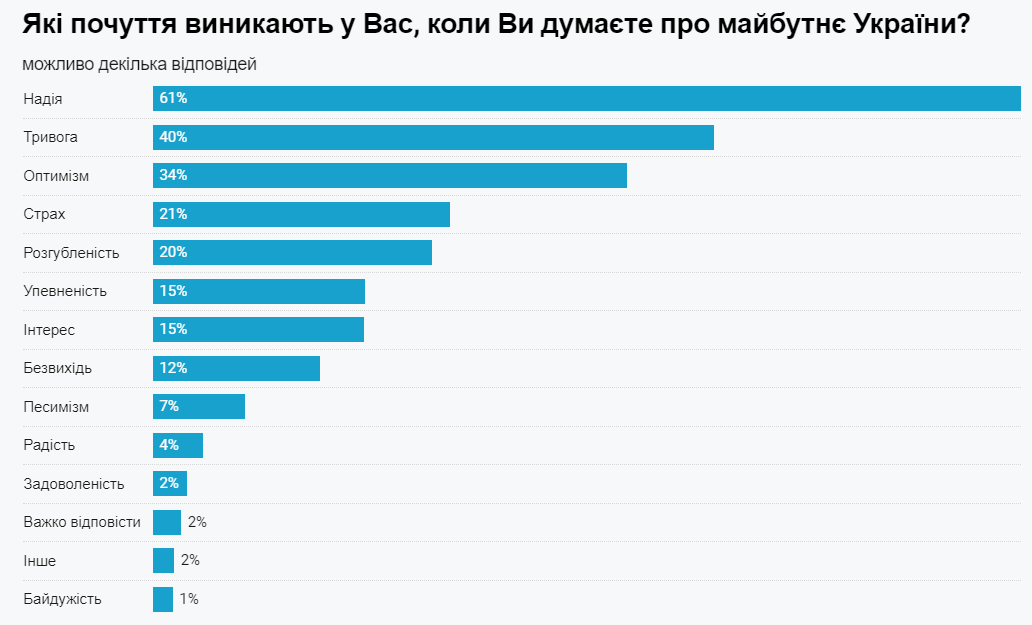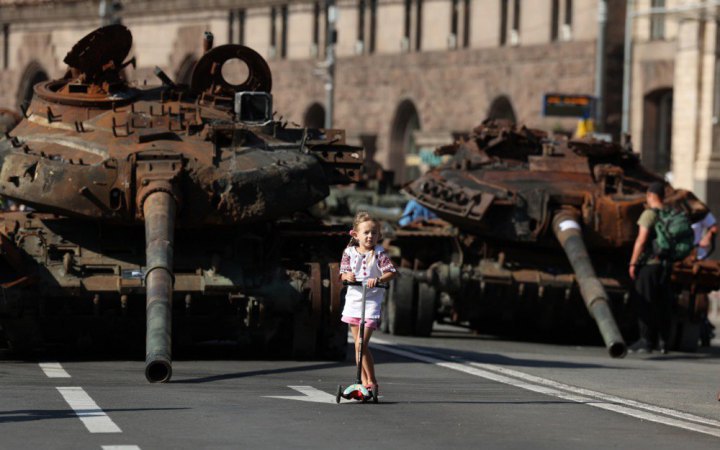The vast majority of Ukrainians (88%) are proud of their citizenship, according to a survey conducted by the Ilko Kucheriv Democratic Initiatives Foundation in cooperation with the Razumkov Centre sociological service.
For the third year in a row, pride in citizenship has been at almost the same level (90.5% in 2022, 88.5% in 2023, 88% in 2024), which is the highest level in the years of sociological monitoring. This level of pride is present among representatives of all age groups.

Financial situation does not significantly affect the feeling of pride in one's citizenship. However, while 86% of the most needy people are proud of it, this figure is slightly higher than the national average (94%) among those with higher incomes.




At the same time, positive assessments of the direction in which events in Ukraine are generally developing have decreased over the past year: currently, 40% of Ukrainians believe that events are developing in the right direction (compared to 49% in 2023), while 37% believe this direction is wrong. Men are somewhat more likely than women to assess the direction of development as correct, while women are more likely to be uncertain.
The vast majority of respondents want to build their future life in Ukraine (86%), with the majority of them demonstrating a clear intention to stay in Ukraine (59%).
This desire prevails among people with different income levels and in all age groups. However, the willingness to stay in Ukraine increases with age. Thus, while 74% of young people want to build their future in Ukraine, 81% of respondents aged 30-39, 87% of respondents aged 40-49, 90% of respondents aged 50-59, and 93% of the oldest group already do.
About 50% of Ukrainians believe that both positive and negative things have happened since Ukraine's independence. At the same time, one in four (25%) believes that there were more positive developments, while for 17%, the negative prevailed.
Among the feelings that respondents have about the future of Ukraine, hope clearly prevails (61%), followed by anxiety (40%) and optimism (33.5%).

The greatest regional differences are observed in terms of the feeling of hope. Thus, it is the least frequently reported in the Eastern macro-region (48.5%), followed by the West (56.5%) and the South (60.5%), while the most widespread feeling of hope is among residents of Central Ukraine (71%). At the same time, hopes for the future of Ukraine and optimism increase with the level of respondents' income, while anxiety, on the contrary, is more pronounced among the poorest segments of the population.
76% of Ukrainians believe that Russians do not perceive Ukraine as an independent sovereign state. Such assessments prevail among all socio-demographic groups of respondents, regardless of their age, gender, type of settlement, level of education and income.
In the regional context, the opinion that Russians do not perceive Ukraine as an independent and sovereign state is also dominant in all macro-regions, but the figures differ somewhat. Thus, this belief is most widespread in the Centre (80.5%) and in the West (78%), and is somewhat less frequently mentioned in the South (72%) and East (66%), although it is still an absolute majority there.
The vast majority of Ukrainians (69%) are convinced that society has become more united during the full-scale war, while 24% believe that this has not happened. The number of those who do not see greater cohesion after the full-scale invasion is highest in the South (32%), East (29%), and West (26%), and lowest in the Centre (18%).
Since the beginning of the full-scale invasion, the vast majority of Ukrainians (71%) have been involved in volunteering to help the army, temporarily displaced persons or people affected by the war. Thus, 34% have helped financially, 15% have provided physical assistance, and another 22% have helped both physically and with money. It is noteworthy that the share of those who helped with money is approximately the same among people of different ages (34-35%). At the same time, 17% of people have not helped and do not plan to do so.








